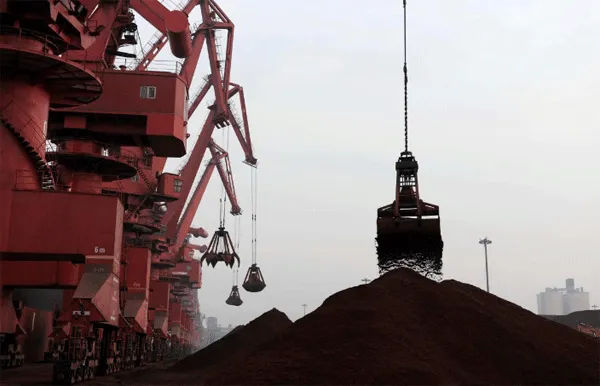Cụ thể, loại bỏ thuế nhập khẩu đối với các sản phẩm thay thế thức ăn chăn nuôi, và thuế đối với phân bón và xuất khẩu quặng sắt nhằm thúc đẩy thương mại với nước ngoài trong bối cảnh nền kinh tế đang chậm lại.

Bốc dỡ quặng sắt tại 1 cảng ở Trung Quốc. Ảnh: Reuters
Theo thông báo chính thức trên trang web của Bộ Tài chính, thuế nhập khẩu đối với các loại bột xay thô thay thế như bột hướng dương và bột cọ sẽ được bãi bỏ từ 1/1/2019 cùng với các nguyên liệu của một số dược phẩm. Đồng thời, Trung Quốc sẽ đánh thuế tạm thời đối với 700 mặt hàng trong năm tới và duy trì mức thuế nhập khẩu tương đối thấp cho động cơ máy bay.
Trung Quốc cũng không đánh thuế nhập khẩu cho 94 sản phẩm vài năm tới như phân bón, quặng sắt, bột gỗ,... Đồng thời sẽ tiếp tục cắt giảm thuế quan được quốc gia này ưa chuộng nhất là 298 sản phẩm công nghệ thông tin vào tháng 7/2019, tuy nhiên tuyên bố không cho biết chi tiết cụ thể.
China unveils tariff adjustments for next year to boost foreign trade
(Reuters) - China announced on Monday adjustments to some import and export tariffs for 2019, removing import duties on alternatives to soymeal for animal feeds and tariffs on fertilisers and iron ore exports, to boost foreign trade as the economy slows.
Import tariffs on so-called alternative meals, including rapeseed meal, cotton meal, sunflower meal and palm meal, will be removed from Jan. 1, 2019, along with those for the materials of some pharmaceutical goods, the finance ministry said in a statement on its website.
China will levy temporary tariffs on more than 700 items next year and maintain relatively low import tariffs for aircraft engines, the ministry added.
Temporary tax rates for manganese slag and lithium-ion battery cells for new energy vehicles will be removed and most-favoured-nation tax rates will be imposed on those products, according to the ministry.
For exports, China will not levy any export tariffs on 94 products next year including fertilisers, iron ore, slag, coal tar and wood pulp.
It will also further cut most-favoured-nation tariffs on 298 information technology products from July 2019. The statement did not give details.



